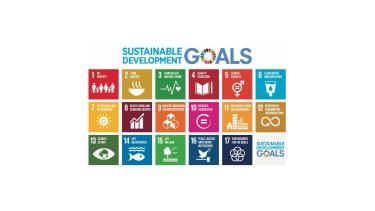On this page, you'll find a report on all the actions and activities initiated at the University of Namur in connection with United Nations Sustainable Development Goal #15: "Life on Earth".
International partnerships
UNIVERSEH
In 2022, UNamur joined the European alliance UNIVERSEH. In all its aspects (science, engineering, economics, business, social sciences and humanities, patenting and innovation, entrepreneurship, science and medicine, art and culture), and through teaching and research, UNIVERSEH will contribute to the European education area, to economic and industrial growth, to solving major societal challenges, and to making the space sector more sustainable, to ensure that the EU remains a world leader in space.
Uniservitate
Uniservitate is an organisation whose aim is to promote Service-Learning in Catholic higher education establishments throughout the world. UNamur is one of the thirty universities supported by the Uniservitate network. It therefore benefits from support for the institutionalisation of Service-Learning. This network is organised into 7 regions: Asia and Oceania, Latin America, North America, North-West Europe, South-West Europe, Central-East Europe and the Middle East, and Africa. Each region is chaired by a "responsible" institution, a central hub.
European University Association (EUA)
As a member of the European University Association, the University of Namur takes part in debates and discussions on the role of educational institutions in climate change and sustainability.
Kircher network
The University of Namur was founded in 1831 by the Society of Jesus. The Jesuit values and educational tradition still guide the University today. These include openness, excellence, sustainability and freedom. It is a member of the Kirche network, a network of higher education institutions linked to the Society of Jesus in Europe and the Middle East. The institutions aim to offer a different kind of education. An integral formation of the individual based on the Ignatian charism that promotes four dimensions: utilitas, humanitas, iustitia and, above all, fides.
Le Confluent des Savoirs (CDS) - Printemps des sciences
Every year, the CDS organizes the "Spring of sciences” (Printemps des Sciences)by offering exhibitions and workshops on biodiversity subjects.
Examples of topics covered in 2022:
The CDS also organized a one-day conference on global warming at Collège Godinne-Burnot.
More info on the Confluent des Savoirs (CDS) here
The Biokot
The BioKot is a student residence supported by the UNamur . The students work for the preservation of the environment.
More info on the Facebook page
A shelter for stray cats
UNamur has set up a shelter for stray cats in the heart of the university car park. More info here
UNamur at the Festival International Nature de Namur (FINN)
Collaborations and partnerships
Farm For Good
Farm For Good is an independent not-for-profit organisation in which farmers hold the decision-making power and define the main strategic directions. Its business model is based on a balance between income-generating and non-income-generating activities, to ensure its long-term financial sustainability. Initiated by the UNamur researcher Clotilde De Montpellier. Find out more
LUCID
Joint ARES research project to understand the impact of land use, particularly maize, on people in the Philippines. Find out more about this project... Learn more
Partnership with the Entre-Sambre-Et-Meuse Park
The Entre Sambre et Meuse National Park (ESEM) extends over the communes of Couvin, Viroinval, Momignies, Froidchapelle and Chimay, a place brimming with geological sites to be enhanced. With its expertise in geography, geology and biodiversity conservation, UNamur is one of its partners and will make its knowledge and experience available to promote and preserve this exceptional natural heritage. Learn more
Lichens Go! project
Lichens Go!, a training workshop that demonstrated how to apply the bioindication protocol and recognize different lichen species. Find out more
Conference: La Troisième Voie du Vivant
On Wednesday November 8 at 8pm, Les Ateliers Paysans-Artisans, La FUCID, La Librairie Point Virgule and Tchak! are joining forces to organize a conference by Olivier Hamant around his latest book: "La troisième voie du vivant". Learn more
Research institute
Institute of Life, Earth and Environment (ILEE)
Research at the Institute of Life, Earth and Environment (ILEE) is relevant to several of the United Nations' Sustainable Development Goals (SDGs). For example, we study the impact of multiple stressors and/or pollutants on organisms but also on ecosystems, and solutions are sought to strengthen their resistance and resilience and/or limit harmful products.
Furthermore, by prospecting and characterising geological resources and by integrating human use over the centuries, from Antiquity to the current Anthropocene, ILEE contributes to the sustainable management of natural resources, including architecture and art. The transition to a more sustainable agriculture is investigated through the concept of ecosystem services via mapping, modelling and integrated assessment. The consequences of climate change on human migration or the interactions between the different agents responsible for the transmission of vector-borne and zoonotic diseases are also at the heart of ILEE's research.
Spin-off
e-biom
Created with the support of the FIRST Spin-off programme of the SPW Research, e-biom is a biological and environmental consultancy company associated with a multidisciplinary laboratory specialising in bio-monitoring, ecological and biological studies. Read more
Fytofend
Created with the support of the FIRST Spin-off programme of SPW Research, the company specialises in plant protection using elicitors (natural stimulants of plant defences). The objective is to become the world's number one elicitor and to meet the challenges of the future. Read more
Research
Prof Frederik De Laender. Published in "Nature".
- ERGA, a European atlas of reference genomes
Discover all publications related to the sustainable development goal "Earth Life" on the UNamur research portal.

